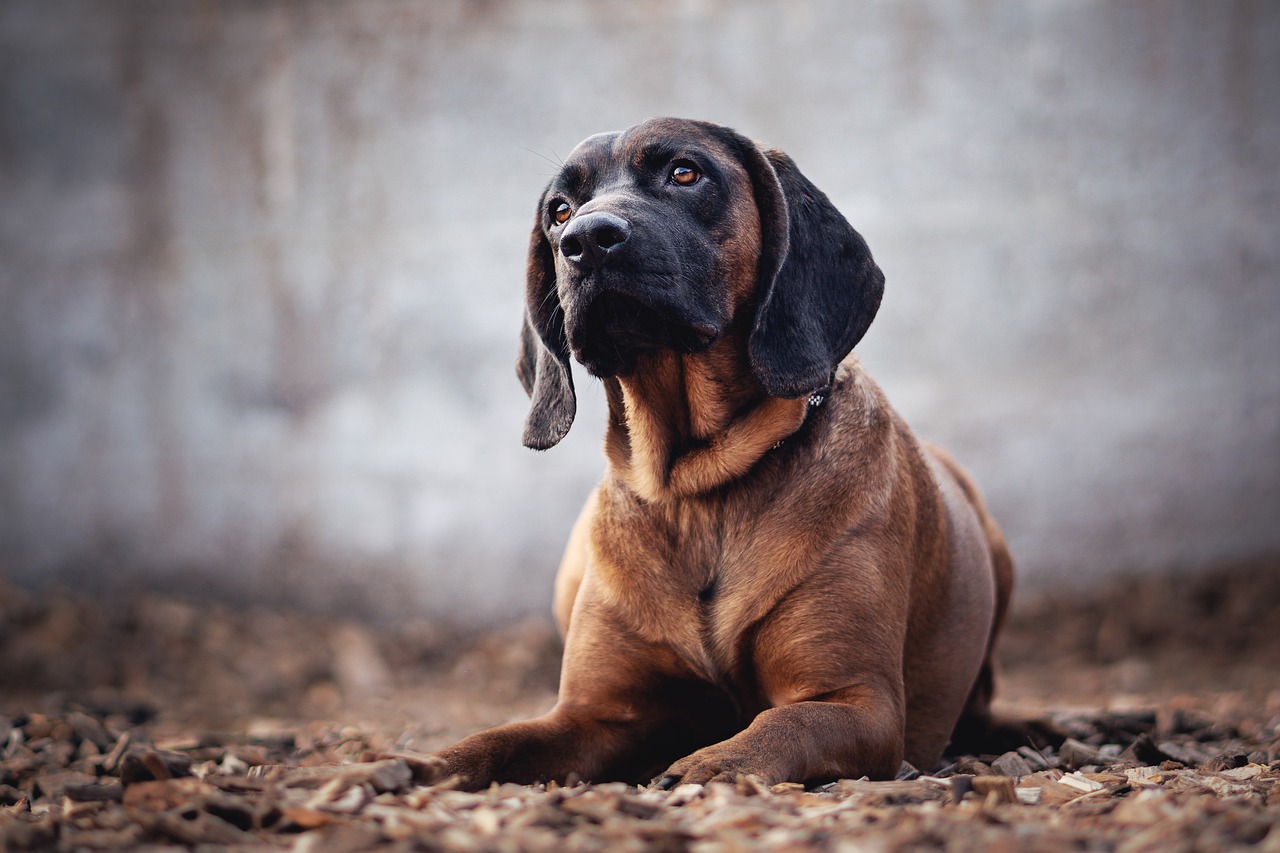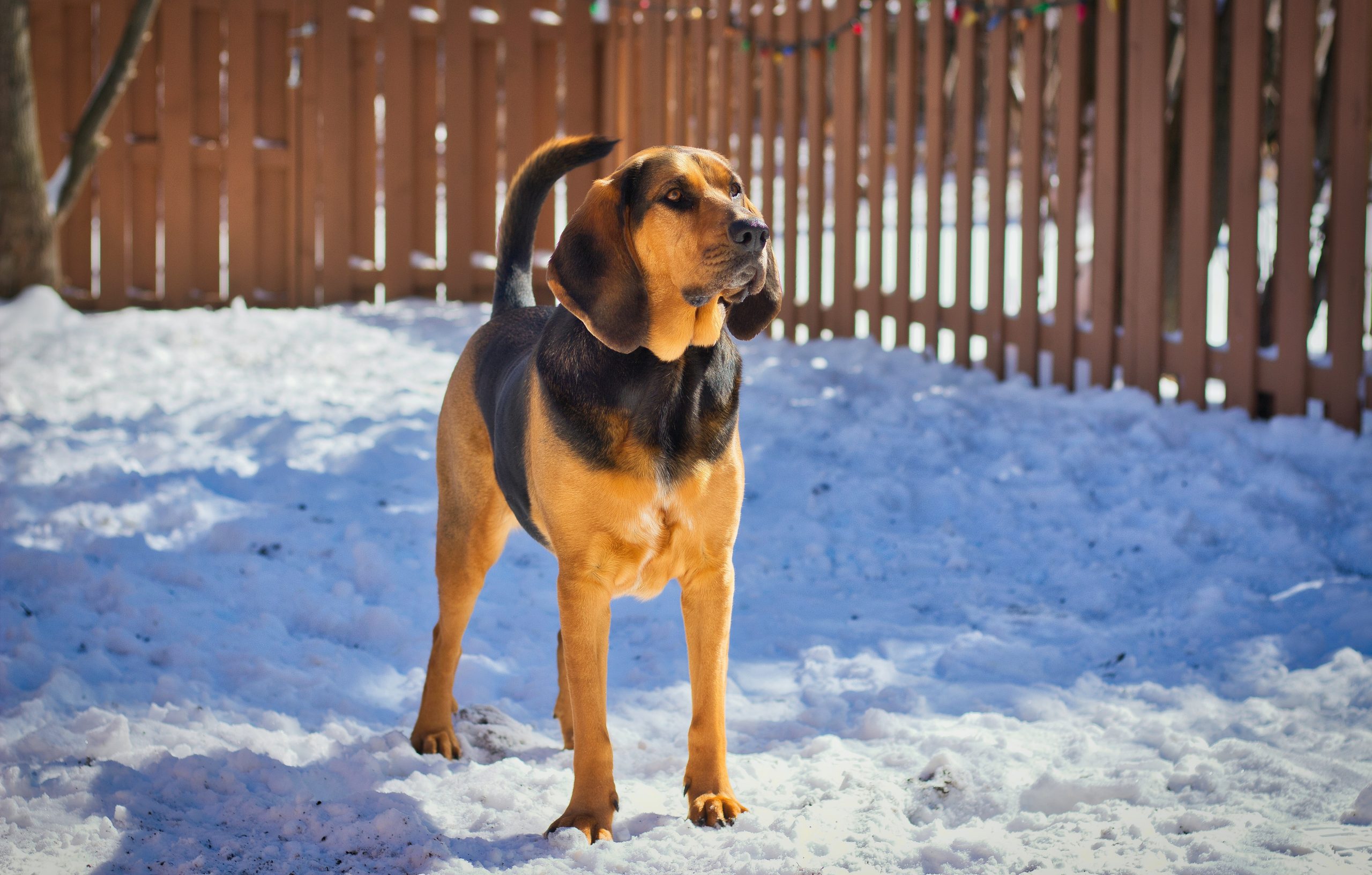Originating from medieval France, Bloodhounds are famous for their impeccable tracking abilities. Known as the “scenthound,” their sense of smell is rivaled only by the Basset Hound. But beyond their detective-like noses, Bloodhounds have a distinct temperament that makes them unique companions.
1. Affectionate
Bloodhounds are deeply affectionate dogs, forming strong bonds with their families. They thrive on human interaction and enjoy being involved in family activities. Often, they’ll display their love through gentle nudges, leaning into their owners, or offering a wagging tail and eager eyes.
2. Determined and Tenacious
Bloodhounds were bred for tracking, and this purpose has ingrained in them a strong sense of determination. When they catch a scent, they can become single-minded, showcasing their focused and tenacious side.
3. Independent Thinkers
While they are trainable, Bloodhounds have an independent streak. This independence means they might sometimes make decisions on their own, especially if an intriguing scent catches their attention.
4. Gentle and Good-Natured
Contrary to their large and imposing size, Bloodhounds are gentle dogs. They’re tolerant and easygoing, making them excellent companions for families, including those with children.
5. Sociable
Bloodhounds, by nature, are social creatures. They get along well with other dogs and animals, especially if introduced and socialized from a young age. Their friendly demeanor, however, means they aren’t the best guard dogs — they’re more likely to greet strangers with a wagging tail than a growl.
6. Energetic yet Laid-back
Young Bloodhounds can be particularly playful and energetic. However, as they mature, they often adopt a more relaxed and laid-back demeanor, content with lounging around the house but still up for daily walks and play sessions.
7. Stubborn at Times
Bloodhounds can showcase a stubborn side, especially during training sessions. Consistent and patient training methods, paired with positive reinforcement, work best for this breed.
8. Vocal
Known to have a deep and melodic bark, Bloodhounds can be quite vocal. Whether they’re catching a scent, seeking attention, or alerting you to someone at the door, their baying can be both endearing and, at times, challenging for owners.
9. Sensitive
Underneath their sturdy exterior, Bloodhounds are sensitive souls. They respond best to gentle training methods and can become upset or anxious if treated harshly. Recognizing and respecting their emotional cues is crucial for a harmonious bond.
Bloodhounds are a blend of contrasts — determined yet sensitive, energetic yet laid-back, independent yet deeply loyal. Understanding and appreciating their unique temperament traits is vital for any prospective Bloodhound owner. With proper training, care, and a whole lot of love, Bloodhounds prove to be incredibly loyal, loving, and dedicated companions, sure to leave an indelible mark on one’s heart.
How Does a Male Bloodhound Temperament Compare to a Female Bloodhound?
Male Bloodhounds:
1. Size & Physicality: Male Bloodhounds are generally larger and more robust than females. This size difference may lead to a stronger presence and slightly different energy levels, which potential owners should consider, especially if they desire a more physically imposing companion.
2. Dominance & Independence: Males might display more dominant behavior and independence. While Bloodhounds are known for their independent streak, males may require more consistent and firm training to establish clear boundaries and expectations.
3. Territorial Behavior: Male Bloodhounds can be more territorial than their female counterparts. This trait means they might be more prone to marking and may need extra socialization to prevent overprotectiveness.
4. Consistency in Affection: While both genders are affectionate, male Bloodhounds tend to be more consistent in their displays of love towards family members. They’re often outgoing and enjoy engaging with people.
Female Bloodhounds:
1. Size Consideration: Females are usually smaller and might be easier to manage, especially for families with children, the elderly, or first-time dog owners who may find a smaller size more manageable.
2. Maturity & Focus: Females often mature faster than males, displaying a sense of focus and understanding of training at an earlier age. This early maturity can make them seem more intelligent and responsive during training.
3. Motherly Instincts: Female Bloodhounds typically have strong maternal instincts. This characteristic can make them protective and nurturing towards family members, displaying a keen sensitivity to the emotions and needs of their owners.
4. Heat Cycles & Behavior: Unspayed females will go through heat cycles, which can affect their temperament and behavior. Owners should be prepared for potential mood swings and the responsibility of managing their cycle or considering spaying.
When choosing between a male or female Bloodhound, potential owners should consider their lifestyle, personal preferences, and the specific needs and traits of each gender. Individual personality differences within each dog can also play a significant role, and it’s crucial to spend time with both male and female Bloodhounds to understand which gender’s temperament aligns best with your expectations. With understanding and care, either a male or female Bloodhound can be a delightful addition to the right home, offering unmatched loyalty and companionship.
Frequently Asked Questions about a Bloodhound‘s Temperament and Personality

- What is the general temperament of Bloodhounds?
- Bloodhounds are known for being affectionate, determined, and independent dogs. They are also gentle, good-natured, and have a laid-back demeanor, making them excellent companions for families.
- How do Bloodhounds behave with children?
- Bloodhounds are typically gentle and patient with children. Their tolerant nature makes them suitable for families, but interactions between younger children and Bloodhounds should always be supervised due to the dog’s large size.
- Are Bloodhounds friendly towards strangers?
- Bloodhounds can be aloof or reserved around strangers but are not usually aggressive. Early and consistent socialization can help them become more comfortable and friendly around unfamiliar people.
- How do Bloodhounds interact with other animals?
- With proper socialization, Bloodhounds can get along well with other pets. Their social nature allows them to coexist peacefully with other dogs, but care should be taken around smaller animals due to their hunting instincts.
- Are Bloodhounds easy to train?
- While intelligent, Bloodhounds are independent thinkers, which can make training a challenge. Consistent, patient, and positive reinforcement methods are crucial for successful training.
- Do Bloodhounds bark a lot?
- Bloodhounds are known for their deep, melodic bark. They may bark to alert owners of strangers or potential threats but are not typically excessive barkers.
- How much exercise do Bloodhounds need?
- As active dogs, Bloodhounds require regular exercise to maintain their health and happiness. A combination of walks, play sessions, and free running in a secure area is ideal.
- Can Bloodhounds be left alone for long periods?
- Bloodhounds can experience separation anxiety if left alone for too long. They thrive on human interaction and companionship and do best in environments where they are not left isolated for extended periods.
- Are Bloodhounds suitable for apartment living?
- While adaptable, Bloodhounds do best with more space due to their size and exercise needs. An apartment may be sufficient if adequate exercise is provided, but a home with a yard is ideal.
- Are Bloodhounds aggressive?
- Bloodhounds are not inherently aggressive dogs. They may act protectively if they or their family are threatened, but aggression is not a common trait in well-socialized and trained Bloodhounds.
- Do Bloodhounds drool a lot?
- Yes, Bloodhounds are known for drooling, especially after drinking or eating. Potential owners should be prepared for this characteristic.
- How are Bloodhounds as watchdogs?
- Their deep bark and protective nature can make Bloodhounds effective watchdogs. However, their friendly demeanor towards known individuals makes them less suitable as guard dogs.
- Is it difficult to groom Bloodhounds?
- Bloodhounds have short coats that require minimal grooming, but they do shed. Regular brushing, bathing as needed, and attention to their ears, which are prone to infection, are necessary for their care.
- Are Bloodhounds hypoallergenic?
- No, Bloodhounds are not hypoallergenic. People with allergies should consider this before getting a Bloodhound.
- Do Bloodhounds have a strong prey drive?
- Yes, as scent hounds, Bloodhounds have a strong prey drive. This trait means they may chase smaller animals, and owners should exercise caution during walks or when in unfenced areas.
What Kind of Person Is a Good Fit for a Bloodhound?
 The Bloodhound is a breed known for its extraordinary sense of smell and strong tracking abilities. While these dogs are loyal and affectionate, understanding the traits and lifestyle that suit a Bloodhound is crucial for a prospective owner.
The Bloodhound is a breed known for its extraordinary sense of smell and strong tracking abilities. While these dogs are loyal and affectionate, understanding the traits and lifestyle that suit a Bloodhound is crucial for a prospective owner.
1. Active Individuals or Families
Bloodhounds require regular exercise to keep them healthy and content. Individuals or families that lead an active lifestyle and can offer ample time for daily walks and play sessions would be ideal for a Bloodhound.
2. Patient Trainers
Due to their independent and sometimes stubborn nature, Bloodhounds need an owner who is patient and consistent with training. If you’re willing to invest time in training and socialization, a Bloodhound can be a wonderful companion.
3. Those With Space
While Bloodhounds can adapt to various living situations, they thrive in environments where they have space to move and explore. Homes with yards or access to open areas are beneficial for this breed.
4. Experienced Dog Owners
Bloodhounds are best suited to individuals who have experience with dogs and understand the nuances of training and care. Their independent streak and training challenges may be difficult for first-time dog owners to navigate.
5. Families With Older Children
While Bloodhounds are gentle and tolerant, their size might be overwhelming for very young kids. Families with older children who understand how to interact with dogs would be a good fit.
6. Individuals Looking for a Loyal Companion
If you seek a dog that forms a deep bond and offers unwavering loyalty, a Bloodhound might be the right choice. These dogs are known for their devotion to their families.
7. Those Prepared for Grooming Needs
Bloodhounds require regular grooming, including ear cleaning, nail trimming, and coat maintenance. Individuals willing to commit to their grooming needs—or those prepared to visit a professional groomer regularly—are ideal.
8. Tolerant of Drooling
Bloodhounds are known to drool, and potential owners should be prepared for this. If you don’t mind some slobber, a Bloodhound can be a delightful companion.
Bloodhounds are unique dogs with a set of characteristics and needs that require understanding and commitment from their owners. Individuals who lead active lives, have patience for training, and can offer plenty of love and attention will find a loving and devoted friend in a Bloodhound. Understanding and embracing the Bloodhound’s traits will lead to a rewarding and fulfilling relationship with this remarkable breed.
 Toledo, United States.
Toledo, United States.
